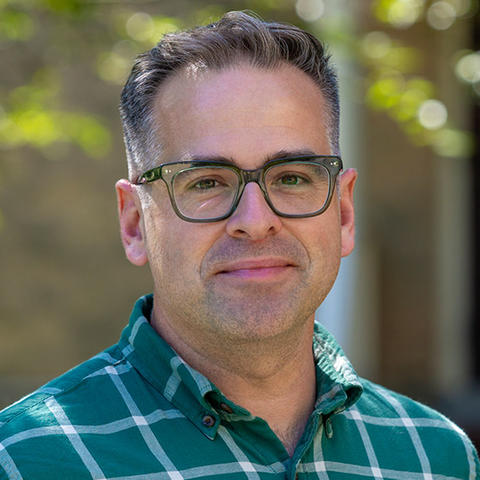Documentary Spotlights Pioneering Professor

Director Rel Dowdell, (right) interviews Roger Lane, emeritus professor of history, in the Philips Wing of the Lutnick Library. Photo by Patrick Montero.
Details
Dr. Ira Reid: Haverford College’s Unsung Scholar Activist explores the impact of Haverford's first Black professor.
During their 50th class reunion in 2019, Steven Bailey ’69 and Stephen Washburn ’69, who had been freshman roommates, got to talking about Ira Reid. A sociologist whose research focused on Black life in America, Reid became Haverford’s first Black professor in 1948, chairing the department of sociology and anthropology until his retirement in 1966. Earlier in his career, Reid, who became a Quaker, collaborated closely with W.E.B. DuBois at Atlanta University and mentored Rev. Martin Luther King Jr. while working for the National Urban League. He later brought King to Haverford for a special summer study program.
Reid had been a beloved professor of Bailey’s when he was a student, and more than half a century later, he and Washburn discussed the need to awaken the campus community and beyond to Reid’s importance.
It was a conversation Washburn, a retired minister, would recall a year later, in the wake of the 2020 murders of George Floyd and Breonna Taylor. He was searching for examples of how to deal with these kinds of injustices, and found one in the life of Reid.
The result of that lightbulb moment is a full-length documentary titled Dr. Ira Reid: Haverford College’s Unsung Scholar Activist, which was screened on campus in May during Alumni Weekend. The film premiered at the International Black Film Festival in Nashville in September 2023, and has had additional screenings, including one sponsored by the Rhode Island Historical Society and Rhode Island Black Film Festival in February 2024.
Washburn, the film’s executive producer, launched the Ira Reid Foundation to help raise more than $80,000 over the past four years to pay for production costs. The project also involved the support of a number of other Haverford figures, credited as producers, including Bailey, James Pabarue ’72, Assistant Dean of the Office of Multicultural Affairs Denise V. Allison (now retired), and Professor of Fine Arts William E. Williams. Aiding the research process for the film were College Archivist Elizabeth Jones-Minsinger and student research intern Taylor Johnson ’24.
The first person Washburn contacted about the idea for the documentary was his senior history project adviser, Professor Emeritus of History Roger Lane, who also gets a producer credit on the film. “I asked him if he believed a documentary film about Ira Reid was needed,” Washburn says. When Lane said yes, Washburn began moving forward, tapping Rel Dowdell as director. Dowdell, whose previous documentary Where’s Daddy? (2018) looks at the interplay of race and the flawed child support system in the United States, says about the film, “There are a lot of unsung African Americans like Dr. Reid who need their stories told. This is an opportunity for Haverford to showcase one of its own.”
Early in the production process, Dowdell came to campus to shoot a series of interviews, including several with Haverford professors who knew Reid during his tenure here. Among them: Roger Lane, Professor Emeritus of French Marcel Gutwirth, and Professor Emeritus of Psychology Sidney Purloe (deceased). Also interviewed were President Wendy Raymond, sociologist Sarah Willie-LeBreton ’86, now the president of Smith College, and Robert Young ’53, who had Reid as an adviser while at Haverford.
Dowdell did additional interviews off campus, including one with philosopher Cornel West, author of Race Matters, who remarked, “It’s about time that this story is told.”
Washburn and Bailey, of course, agree. “In our lifetimes, we have a succession of teachers that instruct and guide us, but there are only a few who really stand out in your memory,” says Bailey. “Dr. Reid was by far and away the best teacher I ever had, and, I would have to say, the smartest man I ever met.”
—Eils Lotozo, with additional reporting by Natalie Pompilio




